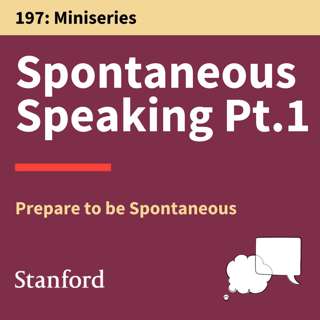
116. Quick Thinks: Don't Sweat the Small Talk
Even if you don’t think you’re a natural, anyone can become proficient at the art of small talk by utilizing the right tactics and behaviors. In this collaboration with Harvard Business Review, strategic communications lecturer Matt Abrahams shares his tips and techniques for cocktail party chit chat, networking small talk, and holiday dinner-table conversation. Watch the full video on HBR's YouTube channel.Connect:Premium Signup >>>> Think Fast Talk Smart PremiumEmail Questions & Feedback >>> hello@fastersmarter.ioEpisode Transcripts >>> Think Fast Talk Smart WebsiteNewsletter Signup + English Language Learning >>> FasterSmarter.ioThink Fast Talk Smart >>> LinkedIn, Instagram, YouTubeMatt Abrahams >>> LinkedIn ********Thank you to our sponsors. These partnerships support the ongoing production of the podcast, allowing us to bring it to you at no cost. Go to Quince.com/ThinkFast for free shipping on your order and 365-day returns. Join our Think Fast Talk Smart Learning Community and become the communicator you want to be.
21 Marras 202314min

115. Rethinks: How We Set and Achieve Goals
Why do we do what we do? What factors drive us? And how do things like competition with others help us achieve our goals?These are the questions most interesting to Szu-chi Huang, an associate professor of marketing with a specific interest in motivation. “Competition definitely increases motivation,” says Huang. “It makes attaining the goal more valuable.”In this episode of Think Fast, Talk Smart, Huang and host Matt Abrahams explore the intersection of human psychology, behavior, and goal attainment — and how communication connects them all.Connect:Premium Signup >>>> Think Fast Talk Smart PremiumEmail Questions & Feedback >>> hello@fastersmarter.ioEpisode Transcripts >>> Think Fast Talk Smart WebsiteNewsletter Signup + English Language Learning >>> FasterSmarter.ioThink Fast Talk Smart >>> LinkedIn, Instagram, YouTubeMatt Abrahams >>> LinkedIn ********Thank you to our sponsors. These partnerships support the ongoing production of the podcast, allowing us to bring it to you at no cost. Go to Quince.com/ThinkFast for free shipping on your order and 365-day returns. Join our Think Fast Talk Smart Learning Community and become the communicator you want to be.
14 Marras 202324min

114. Communication Means Paying Attention: The Four Pillars of Active Listening
We should all be audience-centric in communication. But, as Julian Treasure contests, we need to take it one step further. What is the listening I am speaking into?, he says, is the question every speaker should ask themselves over and over."Every human being’s listening is unique ... we listen through a set of filters and those filters develop as we grow and mature in life and we have experiences. Knowing where the person is coming from, you'll be able to sense their listening."Treasure, an expert on speaking and sound, also offers advice on the breathing techniques that can transform one's speech. "If you want to speak powerfully, develop a breathing practice. And that can be as simple as conscious breathing, which is breathing in through the nose, out through the mouth."In this episode of Think Fast, Talk Smart, Treasure and host Matt Abrahams explore the power of breath; the four steps to show someone we're engaged and listening; and how by framing speech as a gift, we can better serve our audience. Treasure is the author of Sound Business. His most recent book, How to be Heard: Secrets for Powerful Speaking and Listening, is based on his TED Talk. Connect:Premium Signup >>>> Think Fast Talk Smart PremiumEmail Questions & Feedback >>> hello@fastersmarter.ioEpisode Transcripts >>> Think Fast Talk Smart WebsiteNewsletter Signup + English Language Learning >>> FasterSmarter.ioThink Fast Talk Smart >>> LinkedIn, Instagram, YouTubeMatt Abrahams >>> LinkedIn ********Thank you to our sponsors. These partnerships support the ongoing production of the podcast, allowing us to bring it to you at no cost. Go to Quince.com/ThinkFast for free shipping on your order and 365-day returns. Join our Think Fast Talk Smart Learning Community and become the communicator you want to be.
7 Marras 202332min

113. Missing Something? How to Kick FOMO with Conscious Decision-Making
What if you had that job? What if you were with that person? What if there’s a better option out there? If you find yourself asking these questions, Patrick McGinnis invented the term for what you’re experiencing: FOMO.First coined by McGinnis in a piece published by the Harvard Business School newspaper, FOMO (Fear of Missing Out) describes the anxiety we feel when thinking that other people are having more fun and living more fulfilling lives than we are. As McGinnis says, “We are constantly comparing ourselves to other people. We are seeing the options that are out there. And then we're saying, what I'm doing right now isn't good enough. I am missing out on something.”Both in his book, Fear of Missing Out: Practical Decision-Making in a World of Overwhelming Choice, and in this episode of Think Fast, Talk Smart, McGinnis explains how conscious decision-making can help us feel more sure of our choices and experience less anxiety about the options we pass up.Connect:Premium Signup >>>> Think Fast Talk Smart PremiumEmail Questions & Feedback >>> hello@fastersmarter.ioEpisode Transcripts >>> Think Fast Talk Smart WebsiteNewsletter Signup + English Language Learning >>> FasterSmarter.ioThink Fast Talk Smart >>> LinkedIn, Instagram, YouTubeMatt Abrahams >>> LinkedIn ********Thank you to our sponsors. These partnerships support the ongoing production of the podcast, allowing us to bring it to you at no cost. Go to Quince.com/ThinkFast for free shipping on your order and 365-day returns. Join our Think Fast Talk Smart Learning Community and become the communicator you want to be.
31 Loka 202324min

112. From Mistakes to "Missed Takes"
This episode we're sharing an excerpt from Matt Abrahams's audiobook, Think Faster, Talk Smarter. Listen in as Matt explains how to think like a movie director, where a mistake isn't a grave error, but rather a "missed takes" and an opportunity to try again with a new approach.This audio excerpt is courtesy of Simon & Schuster Audio from THINK FASTER, TALK SMARTER by Matt Abrahams, read by the author. Copyright 2023 by Matthew Abrahams LLC. Used with permission of Simon & Schuster, Inc.Connect:Premium Signup >>>> Think Fast Talk Smart PremiumEmail Questions & Feedback >>> hello@fastersmarter.ioEpisode Transcripts >>> Think Fast Talk Smart WebsiteNewsletter Signup + English Language Learning >>> FasterSmarter.ioThink Fast Talk Smart >>> LinkedIn, Instagram, YouTubeMatt Abrahams >>> LinkedIn ********Thank you to our sponsors. These partnerships support the ongoing production of the podcast, allowing us to bring it to you at no cost. Go to Quince.com/ThinkFast for free shipping on your order and 365-day returns. Join our Think Fast Talk Smart Learning Community and become the communicator you want to be.
24 Loka 202320min

111. Rethinks: How to Spark Creativity in Your Communication
“Sparking communication starts with asking why or what or how.”On this episode of Think Fast, Talk Smart, Tina Seelig, the Professor of the Practice at Stanford’s department of management science and engineering and the executive director of the Knight-Hennessy Scholars program, chats with host and lecturer Matt Abrahams about the importance of asking questions about everything we do.“Having a mindset of curiosity opens the door to great communication,” Seelig says. “The more questions you ask, the more you learn, the more engaged you will be with others.”Connect:Premium Signup >>>> Think Fast Talk Smart PremiumEmail Questions & Feedback >>> hello@fastersmarter.ioEpisode Transcripts >>> Think Fast Talk Smart WebsiteNewsletter Signup + English Language Learning >>> FasterSmarter.ioThink Fast Talk Smart >>> LinkedIn, Instagram, YouTubeMatt Abrahams >>> LinkedIn ********Thank you to our sponsors. These partnerships support the ongoing production of the podcast, allowing us to bring it to you at no cost. Go to Quince.com/ThinkFast for free shipping on your order and 365-day returns. Join our Think Fast Talk Smart Learning Community and become the communicator you want to be.
16 Loka 202328min

110. Write It Well: How to Craft an Email to Capture Busy Readers
Whatever you’re writing, Todd Rogers says most people are too busy to read it. That’s why, he says, “you want to make it as easy as possible for them."Rogers is a professor of public policy at the Harvard Kennedy School of Government and the author of the book Writing for Busy Readers: Communicate More Effectively in the Real World. From text messages to fundraising letters to political speeches, Rogers says effective writing makes it “easy for busy readers to navigate what we send them, pull out the key information, and do what they are planning to do anyway, which is move on to the next thing.” This kind of writing, Rogers says, is “more effective for us, and kinder to readers.”In this episode of Think Fast, Talk Smart, Rogers and host Matt Abrahams explore how to use structure, simplicity, and everyday vocabulary to write in a way that saves readers time and transmits ideas more effectively.Connect:Premium Signup >>>> Think Fast Talk Smart PremiumEmail Questions & Feedback >>> hello@fastersmarter.ioEpisode Transcripts >>> Think Fast Talk Smart WebsiteNewsletter Signup + English Language Learning >>> FasterSmarter.ioThink Fast Talk Smart >>> LinkedIn, Instagram, YouTubeMatt Abrahams >>> LinkedIn ********Thank you to our sponsors. These partnerships support the ongoing production of the podcast, allowing us to bring it to you at no cost. Go to Quince.com/ThinkFast for free shipping on your order and 365-day returns. Join our Think Fast Talk Smart Learning Community and become the communicator you want to be.
10 Loka 202330min

109. Simplify! How to Communicate Complex Ideas Simply and Effectively
You said it. But did they hear it? For Frances Frei, communication is about saying things simply enough for an audience to truly understand.As a professor of technology and operations management at Harvard Business School, Frei knows that shaping culture within organizations requires communicating in ways that influence how people think and act. The problem for many leaders, she says, is that when we “understand something deeply, we describe it in a complicated way. If you want broad influence and persuasion, we have to understand it really deeply. And then describe it in a simple and compelling enough way that others can take action.”In this episode of Think Fast, Talk Smart, Frei and host Matt Abrahams explore strategies for simpler communication, building and maintaining trust, and celebrating diverse perspectives within our teams. They also discuss takeaways from Frei's latest book, Move Fast and Fix Things: The Trusted Leaders' Guide to Solving Hard Problems.Connect:Premium Signup >>>> Think Fast Talk Smart PremiumEmail Questions & Feedback >>> hello@fastersmarter.ioEpisode Transcripts >>> Think Fast Talk Smart WebsiteNewsletter Signup + English Language Learning >>> FasterSmarter.ioThink Fast Talk Smart >>> LinkedIn, Instagram, YouTubeMatt Abrahams >>> LinkedIn ********Thank you to our sponsors. These partnerships support the ongoing production of the podcast, allowing us to bring it to you at no cost. Go to Quince.com/ThinkFast for free shipping on your order and 365-day returns. Join our Think Fast Talk Smart Learning Community and become the communicator you want to be.
3 Loka 202328min






















